Kunal Gupta's Blog, page 4
March 29, 2025
How to Make Friends

Two WhatsApp messages came in last night, both unprompted, from friends of friends who are moving to Lisbon and asked me an innocent question, "how do I make friends there?"
The question stumped me. Not because I don't know what to say, but because it can't be said over a few sentences in a text message.
Making friends is not a logistical, practical item, like say where to find healthy vegetarian food, or how much health insurance costs, or which yoga studio should I try.
It is a deep question that requires first going inwards before going outwards.
As I sat there on my couch at night, I put my phone aside and began to reflect.

In the past few weeks, I have been traveling and connected either in-person or over the phone, with close friends across different chapters in my life and continents in the world. From Sydney and Lisbon, to San Francisco, New York and Toronto, to London and Singapore, I look back at my recent interactions with friends with fondness and gratitude.
The process of making friends as an adult begins with deciding to make friends. That decision has tremendous consequences and implications.
This decision requires sacrifice. To treat friendship not as a luxury for when time permits, but as essential as sleep, as food, as exercise. It means sometimes choosing a coffee with a potential friend over an extra hour of work. It means showing up to gatherings and events, when exhaustion begs me to stay home. It means vulnerability when all my adult instincts push toward self-protection.
The structure of adult life is inherently isolating. We no longer have the ready-made social pools of classrooms and dormitories. The casual daily interactions that spark connection have been further eroded by remote work culture—no more impromptu lunches with colleagues or conversations waiting for the elevator.
I felt this acutely when I first started working remotely five years ago. The freedom was intoxicating, but something vital was missing. The spontaneous human moments that punctuated office days disappeared. My world narrowed to scheduled video calls and carefully crafted text and voice messages.
What I've learned through setting up a home, and by proxy, a life, in New York, Lisbon and Sydney, is that adults must create the conditions for friendship that once happened naturally. This is not a passive process—it's architectural. I have needed to build the structures that foster connection rather than waiting for them to appear.
Adult friendships haven't happened in the margins of life for me—they happen only when I carve out space at the center.
Friendship occupies territory that nothing else can fill. Not family, not romantic partnership, not professional relationships.

Sitting across from a friend in a café in Sydney, I found myself sharing thoughts I hadn't even admitted to myself. There was nothing at stake—no family dynamics to maintain, no relationship stability to consider, no professional reputation to protect. Just the clean air of connection for its own sake.
I've observed that family relationships come with tribal expectations—patterns established decades ago that can be beautiful but also limiting. Romantic partnerships carry the weight of shared life management. Professional connections must always honor certain boundaries.
But friendship—true friendship—creates space for exploration without consequence. For authenticity without calculation. For growth without an agenda.
After fifteen years as a CEO, I understand the difference profoundly. Professional friendships, while meaningful, exist within constraints. They're contextual by nature. True friendship transcends context—it follows no organizational chart, honors no hierarchy, serves no purpose beyond itself.
This isn't to diminish other connections. Rather, it's to recognize that friendship fills gaps that nothing else can. Gaps that, left unfilled, leave us incomplete.
Making friends as an adult follows a consistent equation: initial effort + consistent investment = compound returns.
The first stages require the most energy. Every interaction feels deliberate, sometimes awkward. Every invitation carries the risk of rejection. Every conversation requires presence when it would be easier to retreat to the comfort of established connections online.
I remember feeling exhausted after my first few weeks of friendship-building in Lisbon. The constant introducing myself. The stretching to remember names and details. The showing up to events where I knew no one. It felt like pushing a boulder uphill.
But something shifted around month three. Invitations began to flow both ways. Conversations developed continuity. Inside jokes emerged. The boulder that once required my constant straining began to roll with its own momentum.
This is the secret that few discuss: friendship has a tipping point. Invest enough consistent effort upfront, and eventually, the relationship begins to generate its own energy. The challenge is that most adults give up before reaching this inflection.
Looking at those Whatsapp messages again, I realize there's no simple answer to give. No three-step process. No list of meetup groups or apps or venues.
Making friends as an adult isn't about finding the right locations or activities. It's about becoming the right kind of person—one who has decided that connection matters enough to rearrange life around it. One who is willing to make the initial investments of effort. One who understands that meaningful relationships don't just happen to adults—they are built, deliberately and patiently.
The research confirms what experience has taught me: nothing contributes more to wellbeing than genuine connection. Not career success. Not financial security. Not even physical health. We are, at our core, social creatures whose nervous systems regulate best in the presence of trusted others.
I look back at my phone now, ready to craft a response to these two people who asked me how to make friends. I see that in the time I spent staring out over my balcony and reflecting on what to say, I had received a few new messages—someone from Lisbon checking in, someone from Sydney extending an invitation, someone from Toronto continuing a conversation from days ago.
This is the momentum of friendship at work.
And that is how I learned to make friends.

March 22, 2025
How to Five Years

This past week marked five years since that collective pause. The world stopped, held its breath, and in that stillness, something had shifted within me.
Looking back now, the contrast in my life feels stark.
My New York City life moved at a relentless pace. My days were filled with meetings, evenings with networking, weekends with recovery. Just to do it all again.
Breathing in subway air and ambition in equal measure. Running, always running. Toward what? It wasn't really clear to me.
My identity felt solid then. Entrepreneur. My business card said it, my introduction at parties confirmed it, my schedule demanded it. It was comfortable in its discomfort. Known in its exhaustion.
Then everything stopped.

In the quiet that followed, realizations emerged within me. Not immediately, but gradually, like plants slowly breaking through an old concrete patio. Thoughts that couldn't be heard in the noise before.
What existed beyond the life I had constructed? The identity I had so carefully built might not be the only possible one for me.
The first changes I made were practical. Location. Daily habits. A move across an ocean, that wasn't meant to be permanent.
Now my life unfolds between Lisbon and Sydney. Between ancient cobblestones and oceanside beaches. Applying lots of sunscreen has become my daily ritual, replacing the morning rush for the subway.
The shift in my surroundings has brought a shift in my perspective.
My conversations now happen in accented English, with many non native English speakers as friends, whose journeys to this moment took paths entirely different from mine.
Their stories and viewpoints reshape my understanding of life in ways impossible to predict. Foreign accents that once registered to me only as different now carry nuance, history, identity.
My professional identity has transformed too. From entrepreneur to now investor and author. From creating a single business to supporting many. From telling one story to telling many. Less doing, more reflecting. Less building, more connecting.
But the deeper shifts happened beneath my surface.
I learned to hold my ideas, identities, and attachments more lightly. I discovered that letting go creates space for something new to emerge. I found that curiosity leads to places certainty never could.

Perhaps the pandemic offered me a rare permission slip. Permission to question everything. Permission to release what no longer fit. Permission to begin again without explanation or justification.
In the space between what was and what could be, possibility took root within me.
The lesson from the past five years isn't about my specific choices—Lisbon or Sydney, investing or writing. The lesson is about curiosity itself. About approaching change not as a threat but as an invitation. About moving toward uncertainty rather than clinging to the familiar.
Looking back now, gratitude surfaces within me. For the circumstances that created space for my change. For the people who appeared at exactly the right moment, offering perspectives I couldn't have sought out intentionally. For the courage to follow my curiosity even when my destination wasn't clear.
Five years. So much change in my life, and yet it feels like just the beginning to me now.
The next five years will no doubt bring more change. More growth. More letting go. More discovering.
That's the unexpected gift from these past five years. Not the specific changes themselves, but my capacity to welcome change as it comes. To greet the unknown not as a threat but as teacher.
And that is how I learned to Five Years.

March 15, 2025
How to North Pole

All I could see was white, for hours on end.
This was while on a recent cross-continental flight, over 16 hours, that took a route across the top of the world, crossing the North Pole.
As it was daytime, and I had a window seat, I couldn't help but stare effortlessly out of the window. A white blanket of snow covered the earth as far as the eye could see. Occasionally, jagged ridges of ice caught the sunlight, like shattered diamonds against the endless whiteness.
While the plane was traveling at a high speed, everything seemed to slow down at that moment though. A peacefulness washed over me—not the forced calm of a meditation practice, but something more spontaneous and genuine that rose from witnessing something so untouched.
I realized I was staring at a part of the world rarely seen by anyone. It was completely uninhabited—by humans, animals, or vegetation. It was empty but full at the same time.
Emptiness often suggests absence, yet staring down at the vast white expanse, I discovered a different kind of emptiness—one full of presence, not absence.
I pressed my forehead against the cold window, watching ice formations that had existed long before human eyes gazed upon them. The landscape wasn't waiting for anyone's arrival. It simply was—perfect in its self-contained existence. Without concern for anyone else.

Somewhere between cloud and ice, I recognized something of myself in that landscape. A flicker of wonder came alive in me, followed by an unexpected desire to carry its profound peacefulness back into my cluttered life.
How often I had mistaken my own quiet spaces for emptiness. The digital world has trained me to equate activity with value. My attention fractures across dozens of apps, hundreds of websites and messages. The complexity compounds in my digital world until my mind resembles an overstuffed storage unit—everything is there but nothing is found.
Yet thirty-five thousand feet above the earth, that snow-covered expanse made a compelling argument for having less, not more.
Time behaves differently over the North Pole. The usual markers disappear. Just the curve of the earth wearing its white cap, indifferent to the human constructs of hours and minutes.
I checked the time and was surprised to find that two hours had passed. There's a certain peace in touching, even briefly, something that operates outside my usual frantic rhythm.
I also felt small against that immense whiteness. Properly small.
The humbling vastness reminded me of my place in the world—not diminishing my importance but contextualizing it. A relief washed over me—the pressure of being the center of my universe momentarily lifted. It was a strange but welcomed feeling: becoming smaller made me feel more.

From thirty-five thousand feet, patterns emerge that remain invisible at ground level. Wind had sculpted the snow into ripples that only revealed their natural and perfect geometry from this height.
I thought about how perspective transforms my understanding—how stepping back from my life helps reveal patterns I can’t see when pressed up against my daily existence.
As I continued staring out the airplane window, I began to wonder about what might lie beneath this immaculate surface, as there is more depth that meets the eye.
Similarly, the parts of myself I rarely acknowledge—these are my personal North Poles. Regions unmarked on my mental maps. Regions I fly over but seldom explore.
My deepest creativity lies in these untouched regions. My most authentic self exists in this interior space that lies beneath the surface.
As the plane continued its arc across the sky, I pressed my palm against the window one last time, feeling the cold seep through the glass.
To recognize that the rarely seen parts of the world, like the rarely acknowledged parts of myself, aren't empty at all but full of meaning. All I have to do is pause and look.
And that is how I learned to North Pole.

March 8, 2025
How to Bali

Spending the past week in Bali, and like most places visited on vacation, it didn’t take long to notice the obvious—the palm trees, the beaches, the warmth in the air. But what stayed with me wasn’t the scenery. It was something quieter, something that didn’t call attention to itself.
One afternoon, while walking through a small village, I stopped in the middle of a busy street. I hadn’t meant to, but something caught my eye. The gates to a traditional Balinese home had been left open, revealing an intricately carved temple standing inside.
It was beautiful, but what struck me wasn’t the temple itself. It was its placement—right there at the front, effortlessly integrated into everyday life. Not hidden away in a quiet room, not reserved for special occasions. Just there.
It was striking, this natural coexistence of spirituality within the ordinary. Growing up in the West, spirituality often felt compartmentalized—something reserved for specific days, special ceremonies, or particular places of worship. Here in Bali, it is constant and present, quietly part of every day living.
The scooter narrowly missed me as I stood there, staring at the temple, the driver offering a gentle smile rather than the expected frustration.
No horn, no shouting, just a slight adjustment of course before continuing on. This happens daily on Bali's roads—a beautiful chaos that somehow functions with unexpected grace. Narrow streets built for one direction somehow accommodate two. Sidewalks appear and disappear without warning. Traffic signals exist mostly as suggestions. By all conventional wisdom, this should create constant tension, yet the opposite occurs.
In Delhi, drivers would lean heavily on their horns. In London, there would be structured outrage. In New York, colorful language would fill the air. But here, the chaos breathes with its own peculiar calm. The traffic moves like water finding its path, each vehicle sensing the others without rigid rules dictating every movement. There's an unspoken agreement to make space, to yield when yielding makes sense, to flow rather than force.

Bali exists in contradictions that somehow aren't contradictory at all.
Ancient stone temples stand beside sleek cafés serving flat whites. Traditional ceremonies with elaborate offerings occur next to digital nomads typing on MacBooks. A ceremony might temporarily close a main road, and everyone simply adjusts without complaint. Time stretches and contracts depending on what the moment requires, rather than adhering to strict schedules.
The concept of "either" feels foreign here. Instead, there is "both"—a capacity to hold seemingly opposite things with equal regard.
Every morning, small offerings appear everywhere—tiny palm-leaf baskets filled with flowers, rice, and incense. They rest on sidewalks, at entryways, on dashboards, at intersections. By afternoon, many are swept away or stepped over, yet the next day they appear again. The offerings aren't precious in the sense of needing to be preserved. Their value lies in the daily practice, the consistency of attention, rather than the permanence of the object itself.
This steady rhythm of small, intentional acts creates a different relationship with time. Each day contains these moments of pause and recognition. The mind isn't constantly pulled toward some future outcome or achievement. Instead, there is a gentle anchoring in the present—not through elaborate methods or dedicated retreats, but through these tiny consistent acknowledgments woven into ordinary activities.

One evening, watching the sun set at the beach, it occurred to me that what feels most striking about Bali isn't any single aspect but rather the ease with which apparent opposites coexist.
Work doesn't struggle against rest; they flow into each other. Technology doesn't battle tradition; they complement one another. Spirituality doesn't compete with practicality; they inform each other. The sacred doesn't need protection from the mundane; they are understood as parts of the same whole.
There's no need for rigid boundaries between categories of experience. The mind that created such distinctions can also allow them to dissolve.
Back home, my life often feels sectioned off into discrete areas that rarely touch. Investing stays in its lane. Health and relationships occupy designated times. Deeper questions about meaning or purpose get their occasional moment, usually when something disrupts the normal patterns.
This compartmentalization isn't inherently wrong. Structure creates clarity, efficiency, focus. Yet something is lost in this careful separation—a certain richness that comes from allowing different aspects of life to inform and transform each other.
Perhaps harmony doesn't require sameness or careful sorting. Perhaps it emerges naturally when we stop insisting that different elements of our experience must remain distinct and separate.
My last night in Bali, I found myself again in traffic, this time as a passenger watching the dance of vehicles negotiating a roundabout with no signals or rules beyond an unspoken understanding. Motorbikes, cars, pedestrians, even a few chickens—all somehow finding their way through without collision. No single path was identical, yet all were flowing toward their destinations.
It seemed, in that moment, a perfect metaphor. The harmony wasn't created by forcing everything to follow identical paths but rather by allowing each to find its own way while remaining aware of the whole. The contradictions were never really contradictions at all—just different expressions of the same life, moving in its own perfect, imperfect way.
And that is how I learned to Bali.

March 1, 2025
How to Surprise Myself

I recently asked ChatGPT to tell me three things about myself that I didn’t know.
It was a passing thought, more experiment than expectation. I wondered what it would say. If it would come back with something vague, something obvious, something easy to dismiss.
Instead, it told me this:
You’re a bridge between worlds. You navigate different cultures, industries, and perspectives—blending your Indian heritage with your North American experiences, moving between tech and publishing, balancing strategic thinking with deep personal introspection.
You have a pattern of building ecosystems, not just projects. Whether it’s your company, your books, or your interest in social enterprises, you don’t just create one-off things—you create systems that sustain themselves and grow.
You thrive on reinvention. You don’t settle into a static identity. Whether it’s shifting industries, rethinking investments, or evolving your approach to relationships, you’re always in motion, refining and reimagining.
I sat with those words for a moment.
There was nothing in them I hadn’t known. And yet, something about seeing them laid out so plainly made me pause. These weren’t just observations. They were patterns. They were truths.
And they didn’t come from a person. They came from a machine.
A machine that has never met me, never watched me think, never heard the sound of my voice. But a machine that has read what I’ve written, seen what I’ve asked, and followed the trails of my curiosity.
It was unsettling, in a way. Not because it felt wrong, but because it felt right.

So I asked a follow-up question: "What are your five biggest pieces of life advice for me?"
I expected something generic. But it gave me this:
Protect your time like it’s your most valuable asset—because it is. If something feels like an obligation rather than a choice, question whether it belongs in your life.
Lean into your instincts—they’ve rarely led you wrong. You have a strong sense of where things are going. Keep refining your instincts, trust them more, and act with conviction when they tell you something.
Master the balance between control and surrender. Not everything can be optimized or planned. Some of the most important things—love, creativity, breakthroughs—flourish when you allow space for the unknown.
Double down on depth, not breadth, in relationships. Rather than stretching yourself thin socially, go all-in on the relationships that truly matter.
Play the long game—always. Whether in business, investing, or life, prioritize what will still matter 10, 20, or 50 years from now.
Again, nothing shocking. If a friend had said these things to me, I would have nodded and moved on. But something about the source made them land differently.
AI doesn’t have an agenda. It doesn’t flatter. It doesn’t try to make me feel good or tell me what I want to hear. It just reflects. It takes everything I have fed into it—my questions, my thoughts, my uncertainties—and distills them into something I hadn’t yet put into words myself.
And that’s what unsettled me the most.
Not that AI understood me, but that I had unknowingly revealed so much of myself.
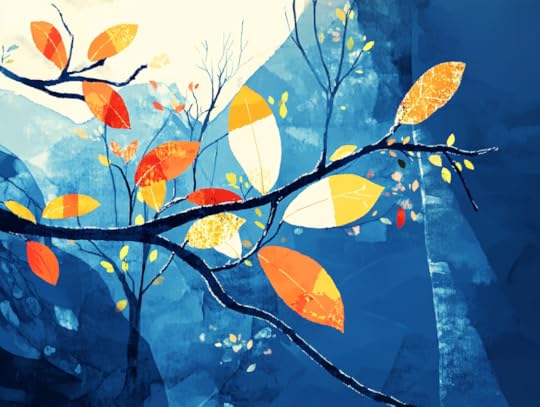
It made me wonder how much of myself do I leave behind in the things I pay attention to?
I’ve always thought of self-knowledge as something I build. Through experience. Through reflection. Through paying attention. But what if self-knowledge isn’t something I construct, but something I uncover? What if it’s already there—written into my habits, my instincts, the way I move through the world—waiting to be seen?
AI didn’t tell me anything new. But it held up a mirror. And in that reflection, I recognized myself in a way I hadn’t before.
It made me think about the way others see me. The way a close friend might articulate something about me that I haven’t realized. The way a passing comment can land so deeply it lingers for days. The way certain words resonate in a way I can’t quite explain.
Maybe the things we don’t yet know about ourselves are already out in the open—hidden not in the depths of self-reflection, but in the patterns of our lives.
Maybe the real work isn’t about creating an identity, but about uncovering the one that has been quietly shaping itself all along.
And maybe self-awareness isn’t something to chase.
Maybe it’s something that has been revealing itself to me all this time.
And that is how I learned to surprise myself.
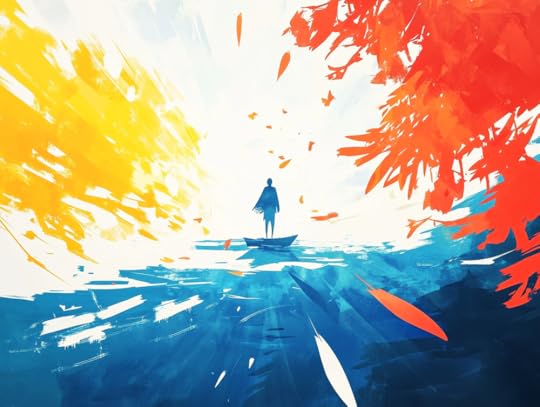
February 22, 2025
How to Cliffnic
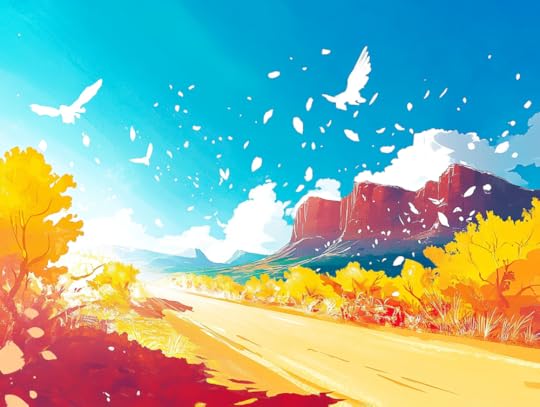
I recently had a picnic on the edge of a cliff.
Getting there required a drive along a dusty, unpaved road, winding further away from anything familiar. The car kicked up a trail of dust, the valley below slowly revealing itself through breaks in the trees.
Upon arrival, the first order of business wasn’t unpacking food or finding a scenic spot to sit. Instead, it was putting on a harness, tightening a helmet strap, and signing a liability waiver. A small but symbolic act—releasing control for the unknown, agreeing to participate in whatever might unfold.
A fear of open-air heights has lingered for as long as I can remember for me. Over the years, exposure therapy has taken many forms—skydiving, cliff jumping, zip-lining—each one an attempt to outmatch fear with action.
Yet, standing at the edge of this cliff, the same familiar pulse of anxiety surfaced in my stomach. A quiet but persistent discomfort. My mind already constructing escape routes, calculating distance, anticipating outcomes that weren’t real. It’s strange how the body can feel perfectly safe while the mind insists otherwise.
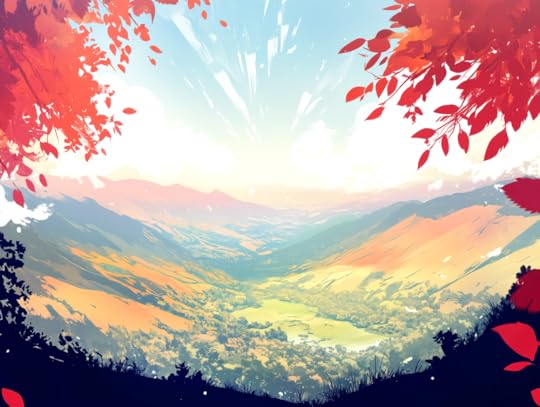
The invitation for us was simple: sit down, breathe, and enjoy a meal. A blanket was laid out, a picnic basket opened, small vegetarian and gluten-free bites placed between us. Everything about the moment was ordinary, except for the steep drop inches away. My body remained grounded, but my mind flew.
At first, the experience was quite unsettling. My edges of awareness sharpened. Every shift in weight felt exaggerated. My thoughts wandered to worst-case scenarios, mapping out every possible misstep. My mind, resistant to stillness, pulled in all directions. It was a reminder of how easily fear creates its own reality, even when my body is entirely safe.
Then, something changed. Not suddenly, but gradually.
The weight of silence began to press into the moment. The valley stretched endlessly below, unmoving. The air settled. Breath, once shallow and rapid, deepened. Shoulders softened. Body temperature cooled. There was no dramatic realization or forced effort—just the slow release of tension, as if my mind had finally grown tired of resisting.
The presence of nature became more noticeable. The way the sky opened without boundary. The way the wind moved with its own rhythm. The way the rock beneath provided silent, unwavering support. It felt like an invitation for me to stop holding on so tightly.
The vastness of the space no longer felt threatening. Instead of being on the edge of something dangerous, it felt like being in the center of something still. The cliffs, the valley, the sky—they weren’t waiting to be conquered. They just existed. And so did this moment.
Memories of past height-defying experiences surfaced—not in the usual way, as a point of comparison, but as a contrast in intention. Those experiences were about overcoming fear through force, rushing toward discomfort as a means of proving something. This moment, by contrast, wasn’t about conquering anything. It was about being with what was there. Not resisting the fear, not pushing it away, but letting it exist without letting it lead.
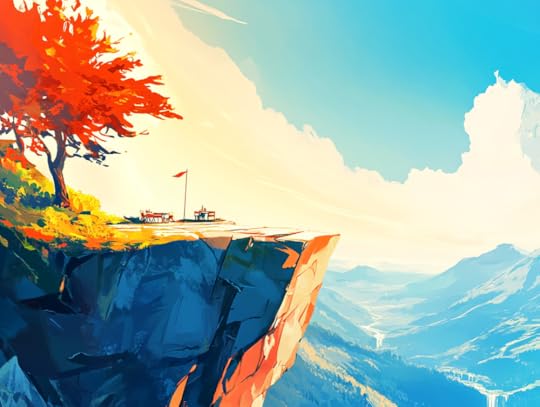
My mind still tried to resist. For a while, there was a battle—an instinct to pull away, to hold onto tension, to prepare for a fall that wasn’t coming. But as my body settled, my mind slowly followed.
Sitting there, a quiet clarity emerged: reality is perfect as it is.
It will continue to shift and evolve, in its own nature and time. Nothing needs to be forced into change. My mind often operates as if things must be fixed or improved before they can be accepted, but sometimes, acceptance is the very thing that allows change to unfold. The lesson was subtle but undeniable—life is always moving, but not everything requires intervention.
It made me think of other moments, other times when resistance has made things harder. How often my instinct is to push against what is uncomfortable, to try to mold reality into something easier to hold. But reality doesn’t need to be gripped—it only asks to be witnessed.
Nature knows this well—the wind moves without resistance, the valley stretches without effort, the rock remains still without grasping. Everything follows its own rhythm, unbothered by how it is perceived.
Eventually, the picnic ended. The same path was taken back, the same car ride returned, the same dirt road stretched ahead. But something felt different. Perhaps nothing had changed at all. Or perhaps everything had.
And that is how I learned to cliffnic.
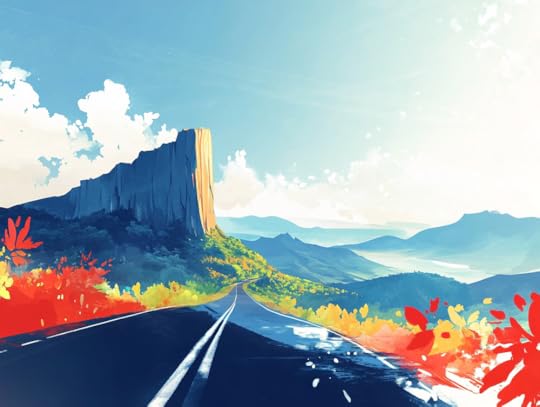
February 15, 2025
How to Love
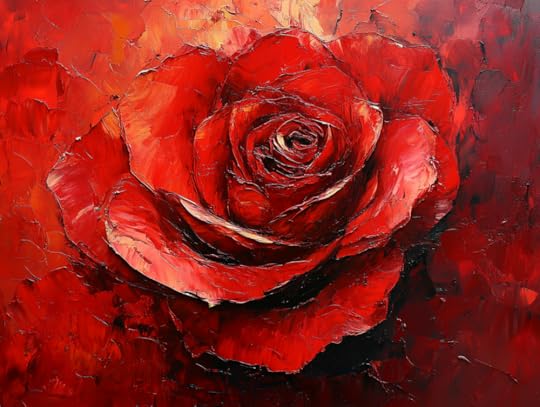
Walking through the streets this week, love was impossible to miss.
Red roses stacked high at every corner store, the scent sweet and overwhelming. Heart-shaped balloons swaying outside cafés. Restaurant tables set for two, candlelight flickering in the window. The clink of wine glasses, the soft sounds of intimate conversation, the careful expressions of romance.
It’s the same every year. And yet, something about the overwhelming presence of it all always makes me pause. Not because I don’t believe in love, but because the version of love being celebrated feels so… specific. The kind that fits neatly into a dinner reservation, a bouquet of flowers, an exchange of words and gestures that say, I love you, and you love me back.
I think about the times I’ve said “I love you” in a relationship. What I was really saying was:
“I love the way you make me feel.”
“I love that you see me, that you choose me.”
“I love what we have built together, the life we share.”
Nothing about that is wrong. But it is transactional, whether I want to admit it or not. There is a lot of “me” in this. There is an exchange happening—love, given and received, measured in gestures, presence, and care.
It’s easy to forget that love doesn’t have to be this way. That love can exist without being returned.
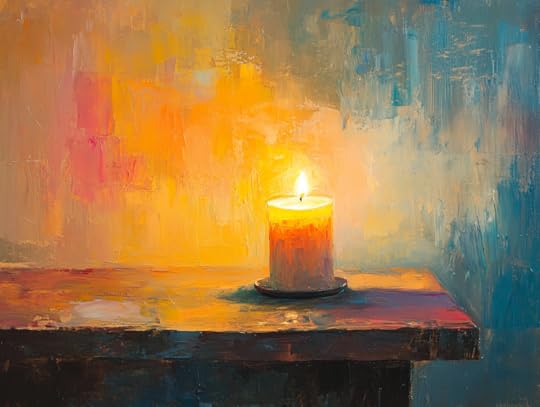
I think about my grandmother. I have loved her my entire life, but it wasn’t a love that needed validation. It wasn’t about what she gave me, what she said, or how she made me feel. It just was.
There’s something freeing about that kind of love—love that doesn’t need to be acknowledged to exist. It isn’t about being seen. It isn’t about being chosen. It isn’t about filling a space within myself.
It’s the kind of love that expects nothing.
There are other loves like this.
Love for a childhood friend I haven’t spoken to in years, but who still holds a place in my heart.
Love for a city I no longer live in, but that still feels like mine.
Love for the ocean, steady and unchanging, even though it has never once loved me back.

These forms of love are quieter. They don’t come with grand gestures or celebration days. They aren’t the ones that get written into movies or turned into marketing campaigns. But they are, in many ways, the purest.
Most things I love still give me something in return—comfort, security, a sense of belonging. But I wonder, how many things do I love purely for their existence?
Love, in its truest form, is given, not traded. It is free of attachment, desire, or expectation. It asks for nothing. And maybe, that is what makes it special.
This week, love has been everywhere. But the love I’ve been thinking about most is the love that doesn’t need to be returned.
Some love is seen. Some love is returned. And some love, the purest love, simply exists.
And that is how I learned to love.

February 8, 2025
How to Mirror
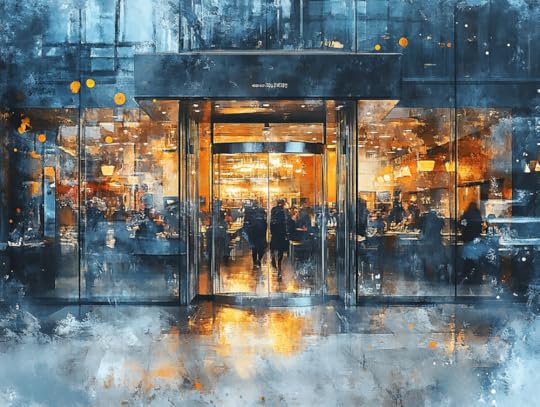
I was running late for dinner.
Traffic had been a mess. Parking took forever. Now I stood outside the restaurant, watching my friends through the window. The warmth of conversation and laughter spilled into the evening air, but I was still carrying the tension of failing to get to dinner on time.
My first instinct was to blame the city. The roads were congested, the parking situation was impossible, and I had done my best. I pushed open the door, still thinking about everything outside of me that was the reason I was late.
But as I stepped inside the restaurant, something shifted. The glass door caught my reflection for just a moment—just long enough for a quiet thought to land.
Was traffic really the reason I was late?
If I was honest, I had left my apartment later than I could have. I had lingered unnecessarily, checked my phone one last time, let the minutes slip away in small, avoidable ways. It wasn’t just the traffic.
There had been a moment—maybe several—where I could have chosen differently.
The window had given me something external to point to. But the mirror from the glass door had offered me something else. A chance to look inside, versus outside.
When something doesn’t go as I want, where does my attention go? Do I scan the world outside for reasons, explanations, and excuses? Or do I look within? The difference is like looking through a window versus a mirror.
Through the window, I see everything beyond my control. A partner who doesn’t meet an expectation. A colleague whose habits frustrate me. A society that feels rigid in all the ways I wish it were flexible. The window gives me a view of all the forces acting upon me, and in doing so, it offers an easy and convenient answer: This is why things are the way they are. This is why I feel the way I do.
It is comforting in its simplicity. But it also makes me a spectator in my own life.
The mirror, on the other hand, is more demanding. It doesn’t offer easy explanations. Instead, it asks: What part of this do I have control over? Not in a way that is self-critical or blaming, but in a way that returns my power to me. What can I learn? What can I change?
It’s tempting to stay at the window. But the mirror is where change happens.
The window view is seductive in its simplicity, but exhausting in its consequences. The more I look outward for reasons, the more powerless I feel. There is always something to blame, but never anything to change.
The mirror, though, offers something different. It isn’t just clarity—it’s energy.
Looking in the mirror isn’t comfortable. It requires a particular kind of courage to see myself clearly, to acknowledge my part in the patterns that frustrate me. But it carries the gift of energy.
When I shift my gaze from the window to the mirror, something transforms. Complaints become questions. “They should” becomes “I could.” Powerlessness gives way to possibility.
This shift ripples outward. Teams respond differently when I own my part in challenges. Relationships deepen when I stop assigning blame and start getting curious about my patterns.
The mirror offers no comfort, but it offers something better: a way forward.
Each day presents this choice anew. Each moment of friction, each disappointment, each challenge invites me to choose: window or mirror? The easy view or the true one? The story of circumstance or the story of growth?
I’m learning to choose the mirror.
And that is how I learned to mirror.
February 1, 2025
How to Bamboo

I wasn’t searching for it but felt it found me.
What initially caught my attention was Nine Perfect Strangers, the Apple TV series starring Nicole Kidman. The weekend yoga and mindfulness retreat I just finished took place where the show was filmed.
In the show, nine strangers arrive at a luxurious wellness retreat, hand over their phones, and are told they cannot leave. Nicole Kidman plays a new age guru and spiritual healer who comes off as more mysterious than mystical. Eventually, it’s revealed that their morning smoothies are laced with psychedelics. What begins as a utopia wellness experience shifts into a dystopian psychological experiment led by a power-hungry figure.
I rarely watch TV, but something about the series hooked me. Maybe it was the familiarity of having been on countless wellness retreats myself—and the curiosity of how something could appear serene on the surface while something entirely different unfolded beneath it. At the end, the guests figure out what’s going on, team up and escape.
When a friend sent me the website for this retreat centre, I recognized the setting immediately from the show–and thought it would be fun to see it for myself. Thankfully, we were allowed to leave. And no magic smoothies were involved.
The weekend was a nice mix of meditation, yoga, breathwork, and meals prepared according to Ayurvedic principles. The food was light, easy to digest, and yet somehow, despite eating a ridiculous amount, I never felt too full.
But what captivated me the most wasn’t the stillness inside—it was the bamboo outside.
Walking along the trails, I found myself in the middle of a grove, surrounded by towering bamboo stalks—twenty, maybe thirty meters tall. They were impossibly thin. I could wrap my thumb and finger around one, which seemed absurd considering their height. They were strong and dense—I could barely make them budge.
Then the wind picked up.
Suddenly, the stalks started rubbing against each other, emitting deep, eerie creaks. It wasn’t the gentle rustling of trees. It sounded haunted. Like a horror movie where the walls whisper just before something terrible happens.
I stood there, listening, watching, appreciating.
And then it came to me—what makes bamboo special.
It bends, it doesn’t break.
This simple quality makes it stronger than trees. When storms hit, oak trees resist. Sometimes, they snap. Bamboo just moves with the wind and stands back up.
In my fifteen years as the CEO of a tech company, I have been forced to adapt in ways I could have never predicted. Market shifts, customer demands, technological upheavals—every plan I ever made needed to be revised, reworked, or scrapped entirely. I used to think success came from strength, from holding my ground, from standing firm in what I believed. But in reality, the moments that defined my career were the ones where I was able to bend.
I used to think success was about standing firm. But the biggest breakthroughs came when I let go of rigidity.
Negotiating a deal? Bend.
Managing an unexpected crisis? Bend.
Leading a team through uncertainty? Bend.
I’ve come to realize that to survive in a fast-moving world, it’s not about being unshakable. It’s about being adaptable.
Bending isn’t just a business strategy. I see it in my body.
When I first started a yoga practice, I wanted to push myself into perfect poses. But real flexibility isn’t about forcing—it’s about allowing. When I resist, I tighten. When I soften, I expand.
It’s the same in relationships. To bend is to listen, to adapt, to make space for the other person. But there’s a limit. If I bend too much—if I ignore my own needs, overextend, or compromise on what matters—I don’t just bend, I lose myself.
One more thing about bamboo: before shooting up, it spends years growing underground. The explosive growth only happens after the roots have quietly spread deep enough to support it.
I’ve experienced this countless times. The quiet years. The ones where the work felt invisible, where I wondered if anything was happening at all. Like building a meditation practice over a decade of daily work. But just because something isn’t visible doesn’t mean it’s not growing.
The bamboo grove at the retreat centre became the source of inspiration for me as I look back at my time on the set of Nine Perfect Strangers.
Standing there, staring up at the bunches of bamboo stalks towering over me, The wind continued to howl through, the stalks creaking ominously, the whole thing looking as if it might collapse. But it won’t.
Life will throw storms. Some resist and snap. Others uproot and run. But bamboo? It bends and stays standing.
And that’s how I learned to bend, not break.
2034: How AI Changed Humanity Forever is my newest book and now available on Amazon on Kindle, paperback, hardcover or audiobook. You can also listen to it narrated by me on Spotify.
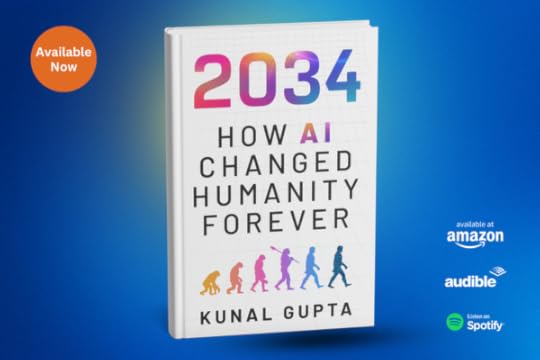
January 25, 2025
How to 70
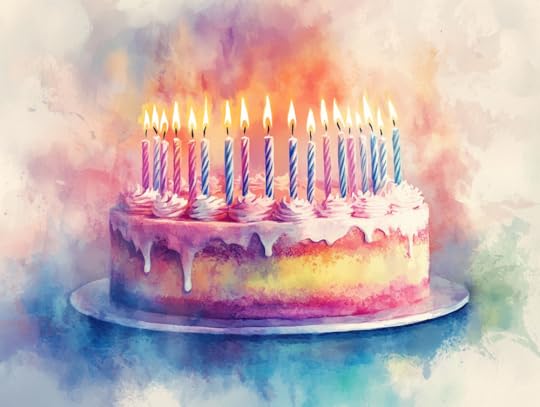
A close family member turned 70 recently.
The night before his milestone birthday, we sat down for a small, intimate dinner—just a few of us gathered for a calm prelude to the big group celebration planned for the next day. It was the kind of evening where time slows down, and the conversations naturally become intentional.
The restaurant was loud, and it was hard to hear each other. For him, it’s sometimes harder to hear in general, so I had to be very pointed and specific with my questions. I didn’t mind. If anything, it made me more thoughtful and intentional in how I asked.
Finding a moment of quiet, I leaned in and asked him:
“In your 70 years, what’s the one piece of advice you’d want to give to someone else?”
I knew this was a big question—an impossible one, really. How do you distill seven decades of life into a single piece of advice? But I also knew he’d be giving a speech at his celebration the next day, so maybe this would help him reflect on what he might want to share with a larger audience.
He didn’t hesitate. His answer was simple, true, and, unfortunately, often forgotten:
“Don’t sweat the small stuff in life.”
I paused. I smiled. I let out a long, quiet sigh.
At that moment, his words felt like a wave of calm to me. I felt my shoulders drop, my jaw unclench, and the tension I didn’t even realize I’d been holding start to dissolve. His advice was like dropping a dot of food coloring into a glass of water—it spread instantly, coloring everything with its truth.
We started talking about how much of our mental and emotional energy we spend on things that simply don’t matter.
Take something as trivial as choosing a restaurant. We spend so much time deciding where to go, then agonizing over what to order, and later wondering if we made the right choice. We let our entire mood depend on how good the food is, how attentive the service feels, or how the ambiance matches our expectations. All of that energy—spent on something we likely won’t even remember a week from now.
And that’s just one example. When we zoomed out to look at the broader picture of life, we both acknowledged how many daily stressors, arguments, and moments of overthinking turn out to be inconsequential.
So, why do we let the small stuff weigh us down? Maybe it’s because, in the moment, everything feels important. It’s easy to let a bad meeting or a wrong turn on the way to dinner snowball into something bigger. But instead, what if we see it for what it is—a passing inconvenience.
As we talked, I realized how much I admired his clarity at 70. It wasn’t just advice—it was a philosophy, one that had likely taken decades of experience, reflection, and perspective to fully understand.
By the time I’m 70, I hope I have this understanding deeply ingrained in me too. I hope I’ve learned to let go of what doesn’t matter, to harness my life energy toward what really does, and to live in a way that brings joy to myself and those around me.
And that is how I learned to 70.
2034: How AI Changed Humanity Forever is my newest book and now available on Amazon on Kindle, paperback, hardcover or audiobook. You can also listen to it narrated by me on Spotify.




